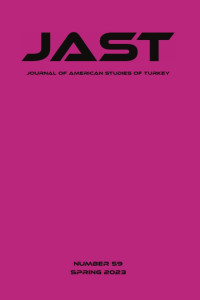Travel and Transgression in Northern Italy in Glimpses of the Moon (1922) by Edith Wharton and Across the River and into the Trees (1950) by Ernest Hemingway
Abstract
In what ways do the experiences of travel and transgression
converge? This question acquires particular focus in the fiction of both
Edith Wharton and Ernest Hemingway when they contemplate their
experience of Northern Italy and in particular Venice. This paper will
offer an analysis of the pattern of transgressions in The Glimpses of
the Moon (1922) by Wharton and Across the River and into the Trees
(1950) by Hemingway. Although the novels are separated by thirty
years around World War II, they are nevertheless bound by their
setting and fundamental theme of seeking refuge in Northern Italy to
escape social entrapment. In different ways, both novels reveal how
crossing one’s border is transgressive as it means challenging one’s
own culture, language, social and sexual norms. This is particularly
true in Venice and in the area surrounding Lake Como in the twentiethcentury, because Northern Italy proves to be a liberating place for all
genders and sexual inclinations at that time. However, transgression
is only temporary as the protagonists in the novels eventually return
to their homeland. The temporariness of their journey is what makes
it transgressive in the first place, just like the Carnival of Venice that
allows all sorts of transgressions once a year.
References
- Adams, James Eli, “The Banality of Transgression?: Recent Works on Masculinity.” Victorian Studies, Winter, 1993, Vol. 36, No. 2 (Winter, 1993), pp. 207-213, Indiana UP. Accessed 8 October 2022.
- Adorno, W. Theodor. Notes to Literature. “Words from Abroad.” Columbia UP, 2018.
- Aldrich, Robert. The Seduction of the Mediterranean: Writing, Art and Homosexual Fantasy. Routledge, 1993.
- Bailey, Brigitte. American Travel Literature, Gendered Aesthetics, and the Italian Tour, 1824-1862. Edinburgh Press, 2019.
- Bowers, Will. The Italian Idea, Anglo-Italian Radical Literary Culture, 1815-1823. Cambridge UP, 2020.
- Calvino, Italo. Invisible Cities. Trans. Harcourt Brace & Company, 1974.
- Carroll, Linda L., “Carnival Rites as Vehicles of Protest in Renaissance Venice,” The Sixteenth Century Journal, Winter, 1985, Vol. 16, No. 4 (Winter, 1985), pp. 487-502, Sixteenth Century Journal, Truman State UP. Accessed 3 April 2022.
- Castle, Terry. Masquerade and Civilization, The Carnivalesque in Eighteenth-Century English Culture and Fiction. Stanford UP, 1987.
- Cavaliero, Roderick. Italia Romantica, English Romantics and Italian Freedom. Tauris Parke Paperbacks, 2007.
- Clarke, Paula C. “The Business of Prostitution in Early Renaissance Venice,” Renaissance Quarterly, Vol. 68, No. 2 (Summer 2015), pp. 419-464, The U of Chicago P on behalf of the Renaissance Society of America. Accessed 15 March 2022.
- Cirino, Mark and Ott Mark P. Hemingway and Italy: Twentieth Century Perspectives. UP of Florida, 2017.
- Cixous, Hélène. The Laugh of the Medusa. Translation by Keith Cohen and Paula Cohen. The U of Chicago P, 1976.
- Eribon, Didier. Insult and the Making of the Gay Self. Duke UP, 2004.
- Foucault, Michel. “A Preface to Transgression,” Language, CounterMemory, Practice: Selected Essays and Interviews. Ed. and Trans. Donald F. Bouchard, Cornell UP, 1977.
- Goldsmith Meredith L., Orland J. Edith Wharton and Cosmopolitanism. UP of Florida, 2016.
- Hemingway, Ernest. Across the River and into the Trees. Vintage Classics, 2017.
- McCarthy, Mary. The Stones of Florence and Venice Observed. Penguin Books, 1972.
- Moddelmog, Debra A. Reading Desire: In Pursuit of Ernest Hemingway. Cornell UP, 1999.
- Mozzi, Giulio, Dario Voltolini. Sotto i cieli d’Italia. Sironi, 2004.
- Owen, Richard. Hemingway in Italy. The Armchair Traveler, 2017.
- Pemble, John. The Mediterranean Passion, Victorians and Edwardians in the South. Clarendon Press, 1987.
- ---. Venice Rediscovered. Clarendon Press, England, 1995. Rosenfeld, Isaac, “Review: A Farewell to Hemingway,” Reviewed Work(s): Across the River and into the Trees by Ernest Hemingway, The Kenyon Review, Winter, 1951, Vol. 13, No. 1 (Winter, 1951), pp. 147-155, Kenyon College. Accessed 11 December 2021.
- Scappettone, Jennifer. Killing the Moonlight, Modernism in Venice. Columbia UP, 2014.
- Wharton, Edith. The Glimpses of the Moon. 1922. Pushkin Press, 2004. Wright Bird, Sarah. Edith Wharton Abroad, 1888-1920: Selected Travel Writings, 1888-1920. Macmillan, 1996.
Details
| Primary Language | English |
|---|---|
| Subjects | North American Language, Literature and Culture |
| Journal Section | Research Article |
| Authors | |
| Publication Date | June 15, 2023 |
| Published in Issue | Year 2023 Issue: 59 |
JAST - Journal of American Studies of Turkey


